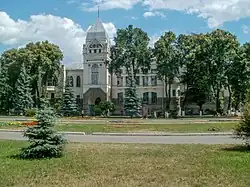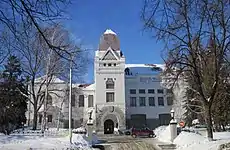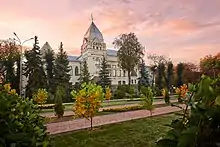| Korolenko Chernihiv Regional Universal Scientific Library | |
|---|---|
| Чернігівська обласна універсальна наукова бібліотека імені В. Г. Короленка | |
 | |
| 51°29′48″N 31°17′32″E / 51.49667°N 31.29222°E | |
| Location | Myru Avenu, Chernihiv, Chernihiv Oblast, Ukraine, 14000, Ukraine |
| Established | 15 March 1877 |
| Other information | |
| Director | Aliferenko Inna Mikhailovna (since 2010) |
| Website | libkor |
Korolenko Chernihiv Regional Universal Scientific Library (Ukrainian: Чернігівська обласна універсальна наукова бібліотека імені В. Г. Короленка) is a public library in Chernihiv, Ukraine. It is devoted to culture, education, history, and science and is the main and largest library in Chernihiv Oblast. In 1922, the library was named after the Russian writer Vladimir Korolenko.[1] The library has 868 thousand books, of which 83% are scientific reference books and publications. In the fund of rare editions of the XIX - the beginning of the XX more than 15,000 editions.
The library is located in the historic building of the Noble and Peasant Land Bank (1910–1913) at Peace Avenue, bldg. 41, Chernihiv.[2]
History
Origin
The Chernihiv Public Library was opened on 28 March [O.S. 15 March] 1877 on the basis of the Statute approved by the Minister of Internal Affairs of the Russian Empire. The institution was founded by a group of the city's intelligentsia, including Oleksandr Tyshchynsky, Sofia and Oleksandr Rusovy, Petro Chervinsky, O. M. Borsuk, O. P. Karpinsky, M. O. Konstantinovich, K. D. Miloradovich, Vasyl Varzar, and Ivan Rashevsky.[3] Ilya Shrag, Petro Yefimenko, M. F. Lindfors, the Kotsyubynskys and Hrinchenkos, Mykola Voronyi, Hryhoriy Kovalenko, etc. were also involved in the library's activities in the first period of its existence.
The original form of existence of the library was a "newspaper reading room". A year later, on 18 February 1878, by the decision of the founders at the reading room, the library was opened. The books were donated to her by the founders themselves - in particular, Oleksandr Tyshchynsky and Stepan Nis donated their own libraries for public use, and part of their collection was donated by the Rusovs. Donations for the maintenance of the institution and the purchase of new books also came from other members of the board, various cultural institutions, and over time - from payment for the use of books. At the end of the first year of operation, the library fund amounted to 564 books.
For the first eight years, the library did not have its own premises. A separate house on Preobrazhenskaya Street was allocated by the city council only in 1895 under public pressure.
The revival of the library's work was facilitated by the inclusion of Mykhailo Kotsiubynsky, Mykola Voronyi, and other writers in its board. Chernihiv Ukrainian Hromada and Prosvita provided great assistance. Then the library organized folk readings, public lectures, concerts. The anti-imperial intelligentsia united around the institution. The appearance of such a Ukrainian cultural center caused dissatisfaction of the Russian authorities, and on the basis of a formal reason - the discovery of illegal literature - in 1909 the Russians closed the library.
In 1910, the library was renamed to the City Library, an institution that belonged to the city government.
Ukrainian People's Republic and Soviet rule
Under the Ukrainian People's Republic, the library functioned successfully, being protected by the laws of the Ukrainian State. But after the occupation of the Ukrainian People's Republic, the Russians resorted to the liquidation of city self-government and handed over all educational institutions to the so-called Narosvit, and on 12 January 1919, the occupiers stopped the library's operation altogether. The book fund began to be forcibly replenished with ideological Russian literature, and the library was maintained at the expense of the occupying authorities. In July of the same year, the Russians talked about opening a central "exemplary provincial library."
In 1920, the library began working in a new building on the street, which was renamed Sovetskaya. In 1921, as a result of the fire provoked by the communists, many property and valuable literature perished, so the library began to function regularly only in 1922. At the same time, she was given the name Korolenko without discussion or justification.
The regional library became known as the "state" library immediately after the Holodomor. Since then, it has become a center of methodological, bibliographic and local lore work of the Chernihiv region, but at the same time a center of ideological influence on the occupied population of Ukraine.
On 24 August 1941, the library was completely destroyed, including its 216,000 holdings and property. The German authorities restored the library, concentrating 148,000 volumes from various city libraries that had not been looted or destroyed under Soviet rule. However, in 1943 the Russians burned this fund again. Formally, the work of the library resumed on 1 December 1943, with the return of the Soviets to Chernihiv.
Post-war
After the Second World War, the main library of Chernihiv slowly recovered, increased its holdings at the expense of Russian literature, and established cultural and educational activities. At first, it was housed in the premises at 60 Popudrenko Street and Yelets Monastery, and since 1974 it has been housed in the current building at 41 Lenina Street (now Peace Avenue). A copy of the building is the building of the Penza Regional Art Gallery.[4]
On the occasion of the 100th anniversary of its founding in 1977, the library was awarded the Diploma of the Verkhovna Rada of the USSR.
On 30 June 2018, the library's funds in the basement were flooded after a heavy downpour. The water level was 1.65 m. The binders of 3,000 local periodicals were affected, as well as about 26,000 art publications.[5]
In the 2000s, the Chernihiv Regional Universal Scientific Library was a significant book depository of the region, a cultural, educational, scientific and information institution that provides accumulation and use of printed publications, a scientific and methodological center of public libraries, a center that coordinates library activities in the region. The library is an accompanying educational base for students of Chernihiv universities.
Russian invasion of Ukraine
On 30 March 2022, during the siege of Chernihiv, the library was bombed, along with the market in the city center.[6][7]
General data
The mode of operation of the library: from 9:30 to 20:00 from Monday to Thursday, Friday - a day off, on Saturdays and Sundays - from 10:00 to 18:00. It offers readers a common and 6 specialized reading rooms, 2 internet centers with free Wi-Fi access. There are about 30 different clubs in the library, literary evenings, exhibitions, presentations and conferences are constantly held.
Literature
- Ukrainian Soviet Encyclopedia
Gallery
References
- ↑ "Chernihiv State Universal Scientific Library named after V. G. Korolenko as the Socio-Cultural Center of the City Community". www.researchgate.net. Retrieved 26 October 2021.
- ↑ "Korolenko Chernihiv Regional Universal Scientific Library". www.cumaps.net. Retrieved 26 October 2021.
- ↑ "Iсторична довiдка". www.libkor.com.ua. Retrieved 26 October 2021.
- ↑ "Сторінку не знайдено". www.ukrainaincognita.com. Retrieved 26 October 2021.
- ↑ "Сторінку не знайдено". www.kyiv.ua. Retrieved 26 October 2021.
- ↑ Anastasiya Kalatur (30 March 2022). "У Чернігові росіяни обстріляли історичну будівлю у центрі міста". www.suspilne.media. Retrieved 30 March 2022.
- ↑ "Російські загарбники обстріляли унікальні історичні пам'ятки Чернігова". www.cheline.com.ua. 30 March 2022. Retrieved 30 March 2022.
External links
- "Чернiгiвська обласна унiверсальна наукова бiблiотека iм. В.Г. Короленка". libkor.com.ua. Retrieved 27 October 2021.




